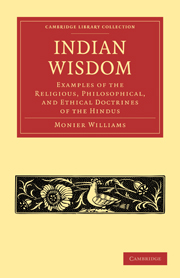Book contents
- Frontmatter
- PREFACE
- THE INDO-ROMANIC ALPHABET WITH THE EQUIVALENT SANSKṚIT LETTERS AND RULES FOR PRONUNCIATION
- Contents
- INTRODUCTION
- LECTURE I The Hymns of the Veda
- LECTURE II The Brāhmana Portion of the Veda
- LECTURE III The Systems of Philosophy
- LECTURE IV The Nyāya System of Philosophy
- LECTURE V The Sānkhya System of Philosophy
- LECTURE VI The Mimāṉsā System of Philosophy
- LECTURE VII Irregular Systems and Eclectic School
- LECTURE VIII Smṛiti. The Vedāngas
- LECTURE IX Smārta-sūtra. Gṛihya, ‘domestic rules’
- LECTURE X The Law-books. Mainu continued
- LECTURE XI Metrical Version of some of Manu's Moral and Religious Precepts
- LECTURE XII The Epic Poems
- LECTURE XIII The Mahā-bhārata
- LECTURE XIV The Epic Poems compared together and with Homer
- LECTURE XV The Artificial Poems
- INDEX
- ADDITIONS AND CORRECTIONS
- ORIENTAL WORKS
PREFACE
Published online by Cambridge University Press: 29 August 2010
- Frontmatter
- PREFACE
- THE INDO-ROMANIC ALPHABET WITH THE EQUIVALENT SANSKṚIT LETTERS AND RULES FOR PRONUNCIATION
- Contents
- INTRODUCTION
- LECTURE I The Hymns of the Veda
- LECTURE II The Brāhmana Portion of the Veda
- LECTURE III The Systems of Philosophy
- LECTURE IV The Nyāya System of Philosophy
- LECTURE V The Sānkhya System of Philosophy
- LECTURE VI The Mimāṉsā System of Philosophy
- LECTURE VII Irregular Systems and Eclectic School
- LECTURE VIII Smṛiti. The Vedāngas
- LECTURE IX Smārta-sūtra. Gṛihya, ‘domestic rules’
- LECTURE X The Law-books. Mainu continued
- LECTURE XI Metrical Version of some of Manu's Moral and Religious Precepts
- LECTURE XII The Epic Poems
- LECTURE XIII The Mahā-bhārata
- LECTURE XIV The Epic Poems compared together and with Homer
- LECTURE XV The Artificial Poems
- INDEX
- ADDITIONS AND CORRECTIONS
- ORIENTAL WORKS
Summary
THE present volume attempts to supply a want, the existence of which has been impressed upon my mind by an inquiry often addressed to me as Boden Professor:—Is it possible to obtain from any one book a good general idea of the character and contents of Sanskṛit literature?
Its pages are also intended to subserve a further object. They aim at imparting to educated Englishmen, by means of translations and explanations of portions of the sacred and philosophical literature of India, an insight into the mind, habits of thought, and customs of the Hindūs, as well as a correct knowledge of a system of belief and practice which has constantly prevailed for at least three thousand years, and still continues to exist as one of the principal religions of the Non-Christian world.
It cannot indeed be right, nor is it even possible for educated Englishmen to remain any longer ignorant of the literary productions, laws, institutions, religious creed, and moral precepts of their Hindū fellow-creatures and fellow-subjects. The East and West are every day being drawn nearer to each other, and British India, in particular, is now brought so close to us by steam, electricity, and the Suez Canal, that the condition of the Hindū community—mental, moral, and physical—forces itself peremptorily on our attention. Nor is it any longer justifiable to plead the difficulty of obtaining accurate official information as an excuse for ignorance. Our Government has for a long period addressed itself most energetically to the investigation of every detail capable of throwing light on the past and present history of the Queen's Indian dominions.
- Type
- Chapter
- Information
- Indian WisdomExamples of the Religious, Philosophical, and Ethical Doctrines of the Hindus, pp. iii - xiPublisher: Cambridge University PressPrint publication year: 2010First published in: 1875

